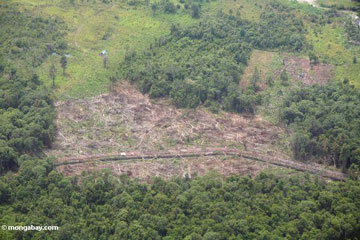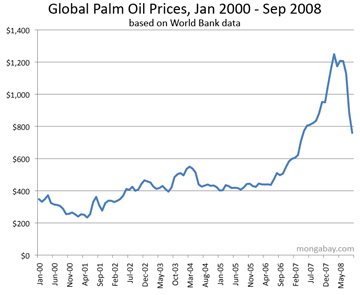First RSPO-certified (“eco-friendly”) palm oil shipment to arrive in Europe
mongabay.com
November 10, 2008
|
|
The first shipment of palm oil certified under the Roundtable on Sustainable Palm Oil (RSPO) is expected to arrive in Europe Tuesday, but an environmental group is already criticizing the initiative’s credentials.
Wetlands International warns that the batch of certified palm oil originates from a plantation which has palm oil grown on peatlands, a carbon-rich ecosystem that releases massive amounts of CO2 when cleared, drained, and converted for agricultural use. It says that RSPO fails to account for greenhouse gas emissions in its certification process.
“Palm oil cannot be certified ‘sustainable’ as long as the sector refuses to include a criterion on greenhouse gas emissions (GHG) from land use change, in particular degradation of tropical peatlands,” said the NGO in a statement. “At the upcoming Roundtable on Sustainable Palm Oil (RT6) to be held on 18-20 November 2008 in Bali, Indonesia, Wetlands International has submitted a Resolution calling for a moratorium on palm oil from tropical peatlands until a GHG Committee has been established and carried out its work.”
 Rainforest clearing for an oil palm plantation in Borneo. The palm oil industry is seeking to improve its environmental performance in response to harsh criticism from scientists and activists who say that oil palm expansion is driving deforestation and putting endangered species at risk. A recent study showed that more than half of oil palm expansion in Malaysia and Indonesia between 1990 and 2005 occurred at the expense of forests, while other research has found that oil palm plantations contain up to 80 percent less biodiversity than logged forests and are a significant source of greenhouse gas emissions when established on peatlands and in tropical rainforests. |
Wetlands International estimates that 8 percent of oil palm plantations in Malaysia and up to 25 percent in Indonesia are now on peatlands. These plantations account for 150 million tons of CO2 emissions annually in Indonesia and 33 million tons in Malaysia.
"Over 50% of new plantations in Indonesia are planned on peatlands despite a Presidential decree in place banning such practices," said Wetlands International. "Peatswamps are the last remaining areas in Indonesia and Malaysia that are still relatively uninhabited. For this reason, the areas are attractive to establish huge plantations at once. Click here for more info about palm oil and peatlands."
The RSPO is an industry-led initiative to certify the environmental performance of palm oil. Palm oil producers are under pressure to clean up operations in order to meet import standards proposed by the E.U. and the United States.
 Oil palm plantation expansion at the expense of natural forest in the Malaysian state of Johor. Image courtesy of NASA’s Earth Observatory / Google Earth. |
RSPO criteria require producers to implement "no burn" policies for land use management, set aside high value conservation areas for protection, mitigate pollution from palm oil mill effluent, reduce the use of fertilizers and pesticides, maintain fair labor practices, and improve yields to reduce the need to convert more land for cultivation. Under a resolution proposed for the upcoming Bali roundtable, some producers have submitted to satellite monitoring of their plantations to ensure no new deforestation is occurring.
Certified palm oil comes at a premium to conventional oil — about $50 per ton according to OVID, the German edible oil industry association that is the first to import certified palm oil to Europe. Despite the higher price, consumer giant Unilever — one of the world's largest consumers of palm oil — has already committed to buying only certified palm oil by 2015.
 With palm oil plunging to $376 in late October (not reflected on the chart), a $50 premium on certified palm oil may be an attractive way for producers to increase margins. |
Petra Sprick, chief executive of OVID, told Reuters that she expects 500,000 to 750,000 tons of certified palm oil will be sold worldwide by the end of the year. Global palm oil production for the 2008 marketing year was nearly 43 million metric tons, 86.6 percent of which was produced by Indonesia and Malaysia.
“We hope that three million tons of certified palm oil will be available on world markets in 2009,” she said, while noting that the first certified palm oil comes under a “book and claim” system whereby a producer gets a certificate for producing a specified amount of oil in a sustainable manner but the actual oil that ships may be mixed with non-certified product.
“This is the beginning which we want to create a financial incentive for the farmers to fulfill sustainability criteria,” Sprick told Reuters.
“This will encourage more certification and hopefully create a critical mass with high enough volumes for a segregated system with a physical identity of the sustainably-produced palm oil through the production chain to the end user.”
Related
EU’s sustainable biofuels push angers Malaysia, Brazil
(11/7/2008) Eight developing countries threatened to file a World Trade Organization complaint against the E.U. for its proposed legislation to require imported biofuels to meet environmental standards, reports Reuters.
Palm oil companies propose satellite monitoring of their plantations to ensure sustainability
(11/5/2008) The Roundtable on Sustainable Palm Oil (RSPO) is considering a proposal to use satellite imagery to enforce criteria that high value conservation areas are not converted to oil palm plantations, reports Ian Wood of the Telegraph. The move would boost RSPO’s credibility at a time when the industry-lead sustainability initiative is under fire from environmentalists who say its performance to date suggests it is merely an exercise in greenwashing.
Oil palm expansion in Indonesian Borneo increased 400-fold from 1991-2007
(10/30/2008) Annual forest conversion to palm oil plantations increased 400-fold from 1,163 hectares in 1991 to 461,992 hectares in 2007 in Central Kalimantan, on the island of Borneo, reports a new report published by Forest Watch Indonesia, a local NGO.
Palm oil industry relies on greenwashing to mislead consumers, alleges report
(10/8/2008) The Malaysian palm oil industry is relying on marketing tactics that mislead the public about its environmental performance rather than taking effective steps to become “greener” alleges a new report from the environmental group Friends of the Earth (FOE).
Palm oil firm becomes first to win eco-certification
(9/28/2008) United Plantations, a Malaysia-based palm oil producer, has become the first oil palm plantation firm to be certified for adopting the strictest standards of sustainability for palm oil production, according to Bernama.
Will consumers pay 10% premium for sustainable palm oil?
(5/21/2008) The first shipments of certified eco-friendly palm oil will arrive in Germany during the second half of 2008 according to the head of OVID, a German edible oil industry group.
Palm oil industry announces “eco” standards for production
(11/26/2007) Palm oil producers — under fire from environmentalists who say the industry is driving the wholesale destruction of biodiverse rainforests in Malaysia and Indonesia — last week announced a new certification process to ensure greener environmental standards for palm oil, reports Reuters.
Greenwashing the palm oil industry
(11/12/2007) A new report from Greenpeace alleges that members of the Roundtable on Sustainable Palm Oil — an industry-driven initiative to clean up palm oil production — are using palm oil derived by clearing endangered rainforests and draining carbon-rich peatlands on the Indonesian island of Sumatra.